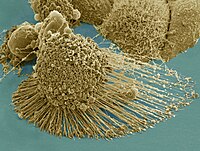
Photo from wikipedia
Cisplatin is a widely used platinum‐based anticancer drug in the chemotherapy of numerous human cancers. However, cancer cells acquire resistance to cisplatin. So far, functional loss of volume‐sensitive outwardly rectifying… Click to show full abstract
Cisplatin is a widely used platinum‐based anticancer drug in the chemotherapy of numerous human cancers. However, cancer cells acquire resistance to cisplatin. So far, functional loss of volume‐sensitive outwardly rectifying (VSOR) Cl− channels has been reported to contribute to cisplatin resistance of cancer cells. Here, we analyzed protein expression patterns of human epidermoid carcinoma KB cells and its cisplatin‐resistant KCP‐4 cells. Intriguingly, KB cells exhibited higher β‐actin expression and clearer actin filaments than KCP‐4 cells. The β‐actin knockdown in KB cells decreased VSOR Cl− currents and inhibited the regulatory volume decrease (RVD) process after cell swelling. Consistently, KB cells treated with cytochalasin D, which depolymerizes actin filaments, showed smaller VSOR Cl− currents and slower RVD. Cytochalasin D also inhibited cisplatin‐triggered apoptosis in KB cells. These results suggest that the disruption of actin filaments cause the dysfunction of VSOR Cl− channels, which elicits resistance to cisplatin in human epidermoid carcinoma cells.
Journal Title: Journal of Cellular Physiology
Year Published: 2020
Link to full text (if available)
Share on Social Media: Sign Up to like & get
recommendations!